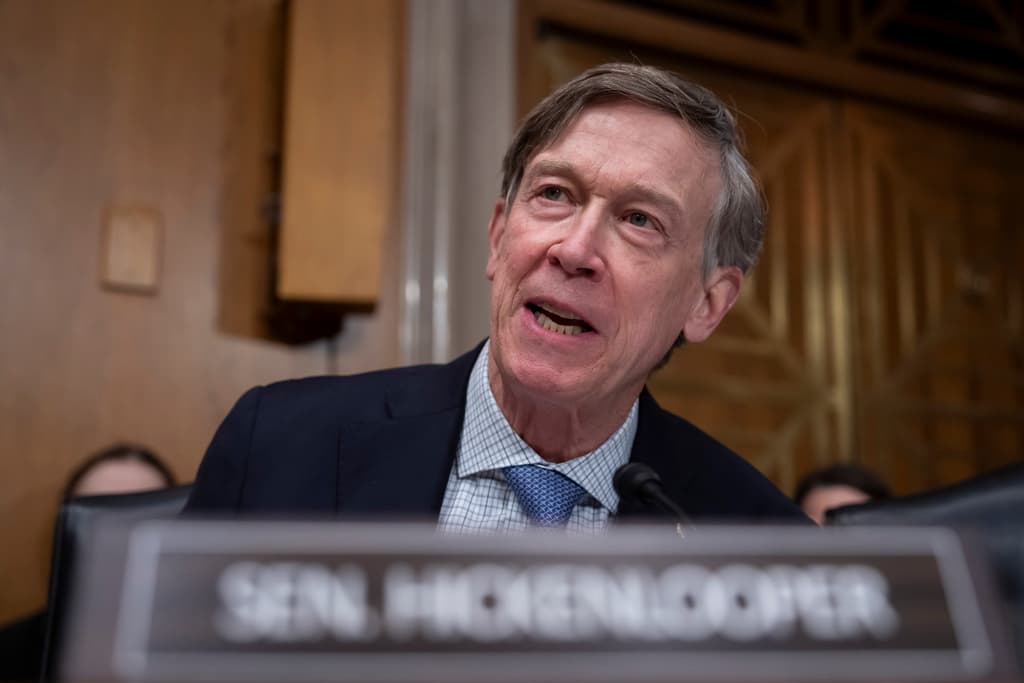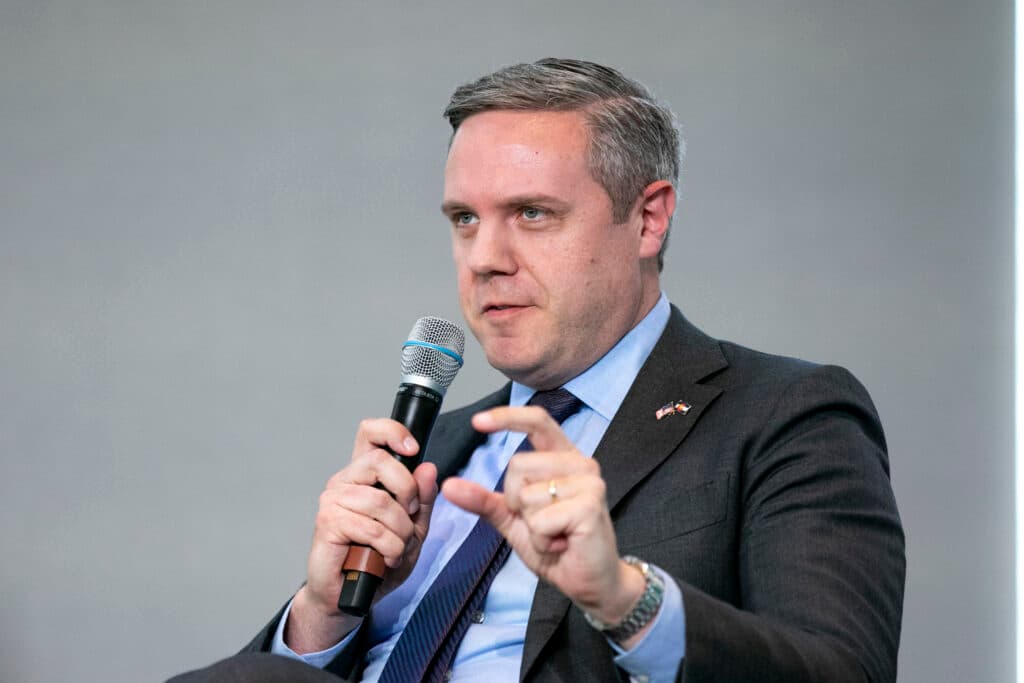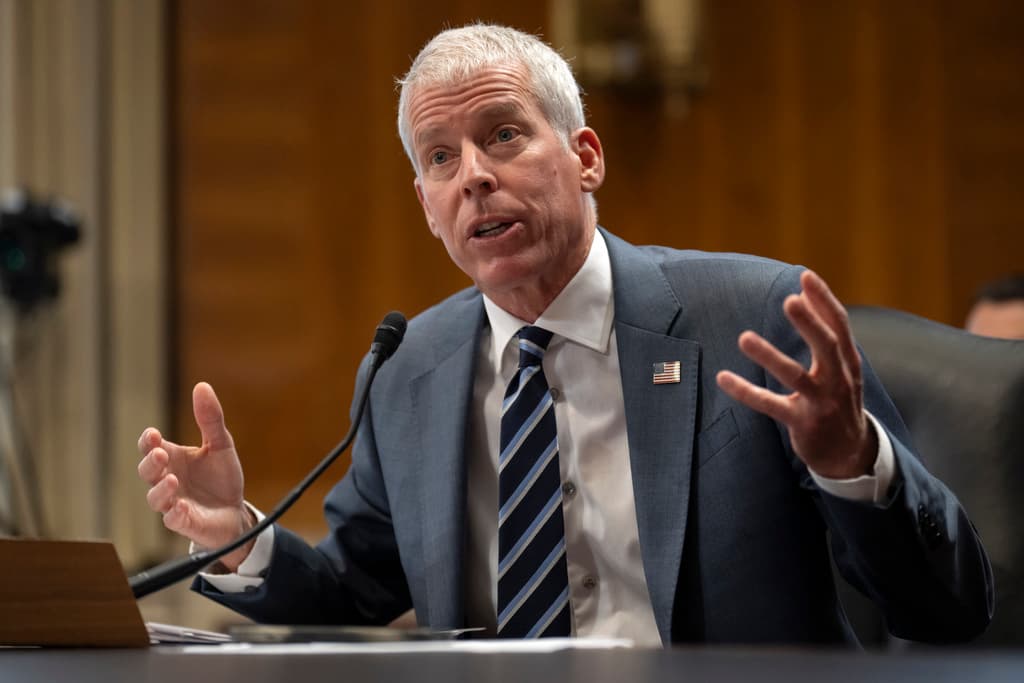
Some Congressional Republicans have voiced support for extending a tax credit aimed at lowering health care costs, but ask U.S. Sen. John Hickenlooper if he’s confident they would deliver that vote without the pressure of a shutdown and the Colorado Democrat guffaws.
“Ha. Do I lack faith?” Hickenlooper told Colorado Matters Senior Host Ryan Warner, adding that plenty of Republicans, including from the Colorado delegation, have stated their support but no commitments.
“I've talked to (3rd Congressional District Republican) Jeff Hurd and (5th Congressional District Republican) Jeff Crank about it, and they — all the moderate Republicans — say, ‘Oh yeah, no, I'm happy to talk about it, but we can't commit to it,’” Hickenlooper said. “Well, if everyone agrees to it, then why can't they commit to a vote?”
At issue are enhanced tax credits that drive down the cost of health insurance purchased through the Affordable Care Act. If those tax credits are allowed to expire, premiums on those insurance plans will go up substantially. Hurd, who represents parts of Western and Southern Colorado that could see rates jump by more than 100%, said he supports an extension but only after the government has reopened.
For Hickenlooper, the cascading effects of that jump in health care costs warrant the uncompromising stance on government funding.
“I'm doing everything I can to make the case to my Republican colleagues that this health care is not just a math error, that these are people's lives. And the reason our caucus is absolutely united around the importance of, especially the subsidy to the exchanges, is because in every state, people's lives are in the balance,” Hickenlooper said. “People lose their health insurance, their chance of dying goes up 40%. That's (from) a huge Harvard study in 2009. So whatever age you are, you lose your health care, the chance that you'll miss an early discovery of a cancer? That's not acceptable in my book, and I think, at least for a lot of the Republicans, I think it's unacceptable, too.”
Hickenlooper, who opposed shutdowns during his time as governor, said he couldn’t forecast how the stalemate would end, but he guessed it would involve appeasing officials in the White House.
“There's a number of things that I can see that Republicans want, but the Democrats also feel would not be the end of the world. And some of these things are issues around making sure that the Congress is able to protect their power of the purse, some of the constitutional responsibilities that have been part of the Senate and the House for 250 years," Hickenlooper said. “I mean, the trouble with that one is that most of the Republicans would be worried that they would be perceived as betraying the White House in some way, and that is that electric third rail to a lot of these discussions.”
Earlier this year, Hickenlooper was criticized by some Democrats for supporting some of President Donald Trump’s cabinet nominees. That included Chris Wright, a former oil and gas executive who now heads the Department of Energy. With the federal government canceling energy grants to states like Colorado, Hickenlooper was asked if he thought his support for Wright had paid any dividends.
“Well, there's a million things that you don't see in text messages, but I am deeply, deeply disappointed in Chris Wright. I've known him for a long time, and I don't know how to say it any better. I'm deeply disappointed,” Hickenlooper said.
Hickenlooper also addressed other concerns about federal government overreach and the ceasefire agreement between Israel and Hamas.
This interview has been edited for length and clarity.
Ryan Warner: You're a member of one of the most powerful government bodies in the world. What is your role in reopening government?
Sen. John Hickenlooper: Well, I think I share an urgency with Republicans and Democrats. Nobody wants this shut down. At least I don't think anybody wants this shut down. I know I don't. So I'm doing everything I can to, you know, make the case to my Republican colleagues that this health care is not just a math error. That these are people's lives. And the reason our caucus is absolutely united around the importance of, especially the subsidy to the exchanges, is because in every state, people's lives are in the balance.
You know, if people lose their health insurance, their chance of dying goes up 40%. That's (from), a huge Harvard study in 2009. So, whatever age you are, you lose your health care, the chance that you'll miss an early discovery of cancer. That's not acceptable in my book. And I think for, at least for a lot of the Republicans, I think it's unacceptable too. I think there are a lot of Republicans in the end who kind of support our side of this argument.
Warner: Well, it's interesting you say that because we spoke just recently with Republican Congressman Jeff Hurd, who represents Pueblo and Grand Junction, and he supports the notion of extending these tax credits that make insurance on the Affordable Care Act exchange less costly. But here's what he told us about the mechanism here.
Rep. Jeff Hurd: “We need to be having that discussion in the ordinary context in which the government is open. And I am concerned about the way that this is being addressed and used as leverage, that the government shutdown is being used as leverage to advance this important public policy discussion. My view is we need to have that discussion. It just needs to be in the context of an open government.”

Warner: So he says there is support among Republicans to have some sort of extension of these credits: Reopen the government, and let's have the discussion. Do you lack faith in the other side, Senator?
Hickenlooper: Ha. Do I lack faith? Listen, we've had this discussion for a couple years when they put this, you know, I, I don't call it the ‘big beautiful bill,’ I think of it as the “big bad betrayal” because I think many of the people that voted for Trump never imagined that this was gonna be a consequence of that election. We talked about (tax credits) when they were deliberating this big bad betrayal. We’ve talked about it since, how important it is. I've talked to Jeff Hurd and Jeff Crank about it. The moderate Republicans say, “Oh yeah, no, I'm happy to talk about it. Oh, but we can't commit to it.”
Well, if everyone agrees to it, then why can't they commit to a vote? Majority in the House, majority of the Senate, and let's see which way it goes. Because I think if that happens, it would pass and all hell would break loose in the House. They won't put it to a vote. Same thing in the Senate. Republicans control the Senate, but they know that there are a bunch of Republicans in there that would probably flip if it came to a binding vote.
Warner: That is, you see the way out of this is to have a clear up or down vote on the tax credits in both chambers.
Hickenlooper: Yeah. We need to get to that point where the American people have some guarantee that the will of their representatives to guarantee their health will get done. And that 4 million people that are now getting coverage on their exchanges, there's 21 million people that would remain, and the 21 million people would be left with increases of 25 to 40% to over 100%. We've seen some with 200% increases. So of the 30 million small businesses in America, 10 million would face severe consequences, most likely lose their coverage, or it would become so expensive as to be prohibitive. That's one third of all the small businesses if we can't get this resolved.
Warner: So you're saying this is not just an individual insured issue, but a small business issue as well, and yet the shutdown creates its own pain points for people. So you're talking about pain on the other side as well. How do you balance those?
Hickenlooper: Well, it's hard. And again, nobody, I mean, the last thing I ever wanted to be associated with is a government shutdown. I was governor of Colorado. Well, after we had the floods in 2013, and the federal government shutdown back then, about exactly the same time of year, at the end of October, right when all the leaf peepers were going up into the mountains to look at, at the leaves turning color. And Estes Park, you know, was totally dependent (on tourism). A lot of those small businesses get 10% of their tourism from people coming in. Now, luckily, Rocky Mountain National Park was gonna close then, and they allowed us to pay to keep it open. And this time at least to keep the doors open, the National Park Service has been willing to do that as well.
But back to your point, there's no question that there's pain involved. And I understand that. The federal employees are gonna get back pay and all over the country we're trying to make sure that they are notified that their local credit unions, and this is not true in every case, but in the vast majority of cases, their credit unions that are offering them a, a zero interest loan against their future paycheck. So them getting paid is obviously a very high level of certainty, or else their credit unions wouldn't be making that offer.
Warner: It's fascinating you bring up the shutdown that happened when you were governor. This was in 2013. You referred to Congress as knuckleheads. Senator Hickenlooper with all — you always know it's gonna sound respectful when someone prefaces it with, ‘with all due respect’ — but are you the knucklehead now?
Hickenlooper: Well, obviously, most knuckleheads don't see the knuckles on their heads. I think what we're fighting for here is indisputable. You know, if you look at the 4 million people that lose their coverage and then the 11 million people who are gonna lose their coverage that they would get through Medicaid — and that's also in that big bad betrayal act. I feel frustrated and angry that I'm part of a government shutdown. And I agree with you that I've been very critical in the past. I do think that our differences here are of a more instantaneous urgency. That this is a wrong and a harm that is gonna be much more immediate and be felt much more deeply by people all across Colorado.
Warner: I come back to the fundamental question of how this gets resolved, because I don't see where either side budges. I guess I'm asking you in a way to answer the unanswerable, but give it a try.
Hickenlooper: That's always served all of you journalists very well. I don't have the perfect answer in my mind's eye. I can see discussions between Republicans and Democrats, perhaps in the Senate with some sort of a negotiation that ultimately gets those subsidies back into place. And that we have to be able to give something to the Republicans so that they can show that they haven't, they haven't given in.
Warner: Ooh, like, what, what, What would that be?
Hickenlooper: I don't have a specific solution, one thing that they would accept. But there are a lot of us, a lot of people having discussions and trying to think about how do we make sure that both sides (are) willing to walk away from this. Because if Republicans really don't care about the health of 36 million Americans, then this could go on a long time. Again. I can't imagine that that's gonna go on. You know, starting Nov. 1, people are gonna start getting their letters on the assumption that the 4 million people are going to be forced off the exchanges. So all the insurance companies that are offering their programs on the exchanges are by necessity, forced to raise their premiums, aAgain, as I said, 25 to 40 to 100%.
Warner: Well, that's a question for me, Senator. Is this a waiting game? In other words, are you thinking that when those letters start to arrive, when people start to see what the increases are, you will have a lever you don't have right now or leverage you don't have right now?
Hickenlooper: Well, I certainly, when people begin to feel the pain that up until that point they've been told this is gonna happen, but they're not really sure when they start seeing those letters, certainly there'll be more leverage, but I'm not waiting for that. Again, closing the government is just a bad idea. Somebody who spent most of my life as a small business person, you don't close, ever, if you can avoid it. I view the government every bit as important to keep open, that we should be doing everything we can. I mean, the White House has done literally dozens and dozens and dozens of things that many of us, not just Democrats, but many of us are concerned about: Eliminating whole government agencies, you know, like USAID, clawing back appropriately-funded commitments. You know, you look at all these cuts that have come in from the Department of Energy, in many cases, those were signed contracts that small businesses in Colorado, or all over the country, these are small business people that they made investments, they got into these projects, and now all of a sudden they're told it's gonna close. They're gonna lose that investment. A lot of them are gonna go bankrupt. And that somehow, the full faith and credit of the United States isn't quite what it used to be. I mean, there are all these things that we've been trying to stop any way we can, but we don't close down government over it.
Warner: So the bar, you're saying, is very high and you see this as a life or death issue. I mean, it's fascinating that you bring up, for instance, rescissions. It's fascinating that you bring up the cuts even without rescissions. There's also the use of the military domestically; these have not been issues you are willing to close the government over.
Hickenlooper: Right. Although any of those things, I think almost all of those things, we will win in court. But that's an expensive, distracting activity that again, just like shutting down the government, it's nobody's first choice.
Warner: Do you wake up as a Democrat each morning asking yourself some version of “what in fresh hell is gonna happen today?”
Hickenlooper: Yeah, you know, I wake up every morning as a former restaurant owner, and — I know you're gonna laugh at this and you're gonna think it's a cliche — but I still think of myself as an entrepreneur on loan to public service. And once the election's over, just like when I first got elected mayor in 2003, back then, my job was to help everyone in the city of Denver. And in that process, part of what I did was go out and talk to all the suburban mayors and all the suburban communities and ask them, “How can Denver help make you a greater suburb? Because we'll never be a great city without great suburbs.” People wondered whether that was appropriate for a Democratic mayor. Most of those suburban mayors were Republican. After the election's over, we're all Coloradans. After the election's over, we're all Americans. I wake up every morning frustrated that I can't go forward with common sense, nonpartisan solutions to some of our serious challenges in this country without getting labeled immediately “this is another Republican this or another Democrat that.” You know, I'm trying to find solutions that are, by their very definition, nonpartisan.
Warner: Well, this question then may strike you as just the sort of thing you're bucking up against but you were complaining about the removal of some energy grants, for instance, and energy funding, and yet you voted to confirm Chris Wright as energy secretary. So I don't know, do you feel like you've gotten anything for a moderate approach?
Hickenlooper: Well, there's a million things that you don't see in text messages, but I am deeply, deeply disappointed in Chris Wright. You know, I've known him for a long time and I, I don't know how to say it any better. I just, I'm deeply disappointed.
Warner: What in particular disappoints you? I'll just say you had a history in oil and gas. You came to this state as a geologist, an oil and gas geologist. You were laid off during a downturn in energy. You obviously worked pretty closely with the industry as governor in coming up with regulations and things.
Hickenlooper: So I have a history of being a geologist. I got a masters in geology back in 1979. In those days we didn't call it climate change. We called it the greenhouse effect. So I have a history in recognizing that climate change is real and urgent. Starting back in the ‘80s, we defined and predicted many of the problems we see today. Massive flooding like we're seeing in Southern Colorado right now, large regional droughts, sea level rising, all these things we've predicted back in the ‘80s. And now suddenly we're being told, “Well, it's not that pressing. We don't really need to worry about it.”

Warner: You have Wright, as a former oil and gas executive, calling on countries to burn more fossil fuels, not fewer.
Hickenlooper: Well, again, I can't tell you how disappointed I am. You know, one of the things that we did when I was governor, we got the largest environmental nonprofits with the two largest operating oil and gas companies in Colorado to be the first government entity of any kind in the world to regulate methane. Methane, which in the short term is 80 to 90 times more harmful in terms of climate change than CO2 is. And we did that by collaborating. It wasn't as a function of attacking the oil and gas or attacking the environmental community. I mean, back when I started studying geology, pretty much every geologist I knew got into it because they were environmentalists. They wanted to be outside. They loved the mountains. They loved, you know, the natural world. And that makes it especially frustrating when we look at all the progress we've made in addressing climate change and how far we've come and seeing that now, all of a sudden, we're gonna jam it into reverse and in the process walk away from legal contracts that our government signed with small businesses all across the country. I can't tell you how frustrating it is.
Warner: Senator, could we go abroad briefly before I let you go? You have just another minute or two?
Hickenlooper: Sure, of course.
Warner: Okay. So obviously a big win for the president in the ceasefire between Israel and Gaza, Hamas. What will you need to see to trust that it's holding, that it's working?
Hickenlooper: Well, like all of America. I am deeply grateful we have, however tenuous, I think the fact that we have a peace there is remarkable. And I am deeply grateful and will do whatever I can to support whatever process is necessary so that that peace evolves into a lasting peace and allows really one of the most conflicted parts of the world to become a place where people can build a business and grow an economy without fear of violence, with a sense of purpose and security.
So we're a long way from that right now. I mean, we now have a shot at it. We have a plan. I think it's incumbent upon all of us to really hope that that plan comes to fruition and does provide, you know, the types of economic incentives and support. There's gonna have to be a lot of support from all around the world, not just rebuilding Gaza, but to rebuilding that whole part of the Middle East in such a way that it can be a self-sustaining economy that allows everyone the right and the opportunity for a good life.
Warner: Can the U.S. make investments in rebuilding Gaza while still supporting Israel?
Hickenlooper: Of course. I think, yeah. The president's going to have to negotiate that. I'm sure Congress is gonna come forward at some point and say, “If we can have a long lasting peace in Israel and in the Middle East, it is incumbent upon and to our self-interest to help make those investments.”









